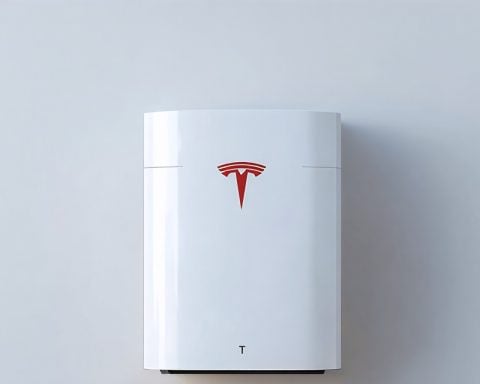Rivian’s stock is experiencing a significant surge, thanks to refreshing developments in its collaboration with Volkswagen. The CEO of Volkswagen, Oliver Blume, has hinted at possible growth in their partnership, which is igniting investor interest. This collaboration dates back to November when they created a joint venture known as Rivian and VW Group Technology, LLC.
Blume indicated that this alliance may bring remarkable results for Rivian, especially as it strives to establish itself in the competitive automotive market. He emphasized the potential for resource sharing, which could enhance both companies’ operational capabilities.
With a staggering investment commitment of up to $5.8 billion from Volkswagen, Rivian has a considerable opportunity to solidify its financial footing. Currently, the partnership emphasizes software development, equipping Rivian with an advanced electric vehicle architecture that is less complex than traditional designs.
In a related boost for Rivian, the company secured a $6.6 billion loan from the U.S. Department of Energy for a new plant in Georgia, further fueling market enthusiasm. Following these announcements, Rivian’s stock surged by over 5%, reflecting growing confidence among investors.
As both companies pursue innovative solutions, their partnership is not merely about financial gain but also about setting new standards for sustainability and innovation in the electric vehicle industry. With strategic efforts aimed at reducing production costs and enhancing supply chain coordination, Rivian and Volkswagen are poised to lead in the electric vehicle revolution.
Broader Implications of Rivian and Volkswagen’s Innovative Partnership
As Rivian’s surge in stock showcases, the implications of its partnership with Volkswagen extend well beyond corporate revenue. The collaboration between these two automotive powerhouses heralds a significant shift in the electric vehicle (EV) landscape, particularly regarding sustainability and technological innovation.
This alliance is indicative of a larger trend, where mega-corporations are pooling resources to tackle the pressing challenges of the global climate crisis. The commitment to advanced software development and less complex vehicle architecture suggests a move towards more efficient manufacturing practices. The potential outcome could lead to lower-priced EVs, making them accessible to a broader segment of the global population, thus accelerating the transition to electric mobility.
Environmental effects cannot be understated. By enhancing operational efficiencies and promoting sustainable production processes, Rivian and Volkswagen are striving to reduce carbon footprints and set industry benchmarks for eco-friendliness. Furthermore, the significant investment from the U.S. government highlights a growing recognition of the EV sector’s role in achieving national energy goals, hinting at favorable regulatory environments for green technologies.
Looking forward, consumer preferences are shifting toward ethical and sustainable brands, and collaborations like that of Rivian and Volkswagen are likely to shape future automotive narratives. In this context, not only can they redefine market dynamics, but they may also inspire a culture of innovation that prioritizes environmental responsibility in the automotive sector.
Rivian’s Partnership with Volkswagen: A Game Changer in the EV Market
Overview of Rivian and Volkswagen Collaboration
Rivian’s stock is soaring following promising developments in its partnership with Volkswagen. The collaboration, which commenced in November with the establishment of a joint venture named Rivian and VW Group Technology, LLC, is already showing signs of significant potential. Oliver Blume, CEO of Volkswagen, hinted at an expansive future for their alliance, piquing investor interest and confidence.
Key Features of the Partnership
1. Resource Sharing: The partnership emphasizes resource sharing, which could lead to enhanced operational capabilities for both companies. This strategy not only aims at cost reduction but also enhances the competitive edge of Rivian in the bustling automotive landscape.
2. Investment Commitment: Volkswagen has pledged an investment of up to $5.8 billion, a substantial financial backing that positions Rivian favorably in a challenging market. This influx of capital will empower Rivian to expand its product offerings and operational reach.
3. Focus on Software Development: The collaboration is increasingly focused on developing advanced software solutions and electric vehicle architectures. The goal is to create a less complex architecture than traditional models, which could lead to improved production efficiency and innovation.
Recent Financial Developments
Rivian has also secured a $6.6 billion loan from the U.S. Department of Energy aimed at financing a new manufacturing facility in Georgia. This strategic move not only reinforces Rivian’s cash flow but also reflects the growing optimism among investors, as evidenced by a notable 5% increase in Rivian’s stock price following these announcements.
Sustainability and Innovation Goals
Both Rivian and Volkswagen are committed to pushing the boundaries of sustainability in the electric vehicle market. Their partnership is not solely focused on financial outcomes; it aims to set new benchmarks for environmental responsibility and innovation. By pursuing cutting-edge technologies and optimizing supply chain processes, they are positioning themselves as leaders in the evolving EV sector.
Market Trends and Predictions
With the electric vehicle market expected to grow rapidly over the next decade, Rivian is uniquely positioned to capitalize on this trend thanks to its collaboration with Volkswagen. Experts predict that such partnerships will become increasingly common as companies seek strengths in technology and market reach.
Limitations and Challenges
While the partnership holds immense potential, there are challenges to consider. Rivian must navigate the competitive landscape characterized by established players like Tesla and new entrants in the EV segment. Additionally, sourcing materials for battery production remains a critical hurdle that could impact scalability and sustainability.
Conclusion
Rivian’s collaboration with Volkswagen signifies a pivotal shift in the electric vehicle industry, marked by innovative approaches to manufacturing and sustainability. As both companies continue to deepen their partnership, they could redefine the standards of electric mobility. Investors and consumers alike will be watching closely to see how this relationship evolves and what it means for the future of the automotive market.
For further insights and updates on Rivian, visit Rivian, and for Volkswagen’s latest developments, check Volkswagen.













